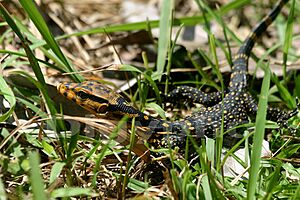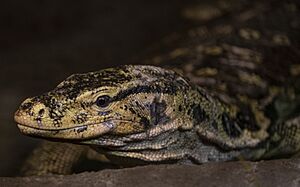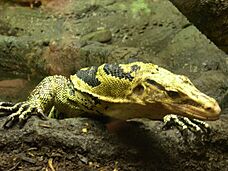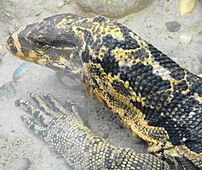Yellow-headed water monitor facts for kids
Quick facts for kids Yellow-headed water monitor |
|
|---|---|
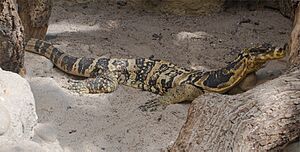 |
|
| Conservation status | |
| Scientific classification | |
| Genus: |
Varanus
|
| Species: |
cumingi
|
| Synonyms | |
|
|
The yellow-headed water monitor (Varanus cumingi) is a large monitor lizard. People also call it Cuming's water monitor, the Mindanao water monitor, or the Philippine water monitor. This lizard lives only in the Philippines. It likes to live near water, like in mangroves and forests. It eats birds, fish, small mammals, and dead animals.
Contents
About This Lizard
The yellow-headed water monitor was once thought to be a type of water monitor. But since 2007, scientists have agreed it is its own unique species.
Why the Name cumingi?
The name cumingi honors Hugh Cuming. He was an English expert who studied shells and plants.
Where It Lives
V. cumingi lives in the southern Philippines. You can find it on the island of Mindanao and some smaller islands nearby.
What It Looks Like
The yellow-headed water monitor has more yellow color than other water monitors in the Philippines. It is a large lizard. The biggest ones can grow up to 1.5 m (4 ft 11 in) long. Their body, from snout to vent, can be about 60 cm (24 in). They can weigh around 2.5 kg (5.5 lb).
Its Home
V. cumingi prefers to live in natural places like mangroves and wet forests. But it can also be found in places made by humans. These include fish ponds and farm lands.
What It Eats
The yellow-headed water monitor eats many different things. Its diet includes rodents, birds, and fish. It also eats crustaceans, mollusks, and other small animals without backbones. Sometimes, it eats eggs and dead animals.
Different Types
There used to be two recognized types of V. cumingi. One was V. c. cumingi, found on Mindanao and nearby islands. The other was V. c. samarensis, found on Bohol, Leyte, and Samar islands. However, V. c. samarensis is now considered its own full species, called Varanus samarensis.



